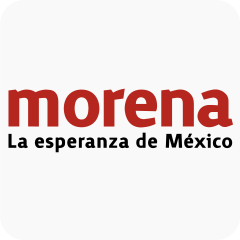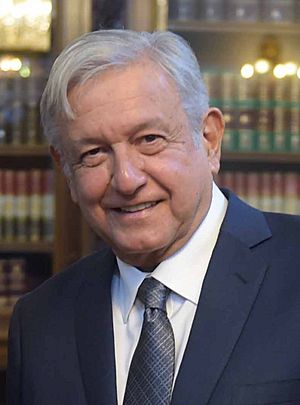Morena (political party) facts for kids
Quick facts for kids
National Regeneration Movement
Movimiento Regeneración Nacional
|
|
|---|---|
 |
|
| Abbreviation | MORENA |
| President | Mario Martín Delgado |
| Secretary-General | Citlalli Hernández |
| Senate Leader | Eduardo Ramírez Aguilar |
| Chamber Leader | Ignacio Mier Velazco |
| Founder | Andrés Manuel López Obrador |
| Founded | 2 October 2011 |
| Registered | 10 July 2014 |
| Split from | Party of the Democratic Revolution |
| Headquarters | Santa Anita #50, Col. Viaducto Piedad C.P. 08200 Iztacalco, Mexico City |
| Newspaper | Regeneración |
| Membership (2023) | |
| Ideology |
|
| Political position | Left-wing |
| National affiliation | Sigamos Haciendo Historia (2023–present) Juntos Hacemos Historia (2020–2023) Juntos Haremos Historia (2017–2020) |
| Regional affiliation | São Paulo Forum |
| Colours | Maroon |
| Slogan | La esperanza de México ('The hope of Mexico') |
| Chamber of Deputies |
202 / 500
|
| Senate |
58 / 128
|
| State governors |
21 / 32
|
| State legislatures |
406 / 1,112
|
| Mayors |
406 / 2,043
|
The National Regeneration Movement, often called Morena, is a big political party in Mexico. It is known for its left-wing ideas. As of 2023, Morena has the most members of any political party in Mexico. It has been the ruling party since 2018 and won again in the 2024 general election.
The party's name, "Morena," is a nod to Mexico's patroness, the Virgin of Guadalupe, who is sometimes called 'La Morena'.
Morena started as a non-profit group in 2011. It became an official political party in 2014. Andrés Manuel López Obrador, who ran for president three times and is now the President of Mexico, led the party until 2017.
For the 2018 elections, Morena teamed up with other parties to form the "Juntos Haremos Historia" (Together We Will Make History) group. They won the presidency with 53% of the votes. They also won most of the seats in both the Senate and the Chamber of Deputies. In the 2024 election, Morena's candidate, Claudia Sheinbaum, won by a lot. She became Mexico's first female president-elect. She will take over from Andrés Manuel López Obrador on October 1.
How Morena Started and Grew
Becoming a Political Party
Morena began as a group on October 2, 2011. Its first goal was to support a political movement for the Mexican elections in July 2012.
After the 2012 elections, the group decided on November 20, 2012, to become a political party.
At their first big meeting on November 20, 2012, delegates from all 32 states chose 300 council members. These members formed the Morena National Council. They agreed on the party's rules and action plan. The council members chose Andrés Manuel López Obrador as the president of the National Council.
Early Years: From Movement to Party (2011–2016)
Andrés Manuel López Obrador officially started Morena as a non-profit group. It was a democratic movement to protest against political problems and unfair elections. It also spoke out against policies he called the "power mafia." The group gained support from student movements. It became an organization that supported López Obrador for president in the 2012 election.
After López Obrador lost the 2012 election, he left his old party. Morena then changed from a movement into a political party, with López Obrador as its leader. On January 7, 2014, Morena asked the National Electoral Institute (INE) to become an official political party.
In 2014, López Obrador explained why he left his old party. He said its leaders had supported policies that hurt the people, like raising taxes and gas prices. He felt he could not be part of a party that approved such measures. On July 10, 2014, the INE approved Morena as an official political party. This meant it could get government money and take part in the 2015 elections.
First Elections: 2015 Legislative Elections
The 2015 elections were the first time Morena ran as an official political party. They won 35 seats in the Chamber of Deputies. This included 14 district seats and 21 proportional seats.
Working Together: "Juntos Haremos Historia" (2017–Present)
The 2018 general election was the first time Morena ran for president. Morena joined forces with the Labor Party and the Social Encounter Party. Their group was called Juntos Haremos Historia (Together We Will Make History).
Why They Formed an Alliance
In June 2017, the Labor Party agreed to work with Morena for the 2018 election. This alliance was made easier when the Labor Party's candidate stepped aside. He asked people to vote for Morena's candidate in a state election.
Later, in October 2017, the Labor Party officially joined Morena.
There was talk about all left-wing parties in Mexico joining together. But López Obrador said no because of political differences. This was especially true after state elections where other parties did not support Morena's candidate. In November 2017, Morena and the Social Encounter Party announced they were talking about an alliance.
The Alliance Becomes Official
On December 13, 2017, the Social Encounter Party joined Morena and the Labor Party. The alliance was officially named Juntos Haremos Historia. López Obrador became the presidential candidate for all three parties. This alliance meant they would work together for the presidency and divide up the legislative elections.
Some people criticized this alliance because it brought together two left-wing parties with a Christian-conservative party. Morena's president said her party believes in including everyone to "rescue Mexico." The Social Encounter Party's president said that López Obrador offered the only real chance for change in Mexico.
Election Results and What Happened Next
On July 1, 2018, Andrés Manuel López Obrador won the presidential election with 53% of the votes. Morena won 55 seats in the Senate and 156 seats in the Chamber of Deputies. They also won the governorships in four states: Mexico City, Chiapas, Tabasco, and Veracruz.
After the 2018 election, some politicians from another party joined the Morena-led government. This gave the government a strong majority, allowing them to pass new laws.
In the 2021 elections, Morena's group kept a simple majority in Congress. However, they did not get the two-thirds majority needed for big changes to the constitution.
What Morena Believes In
Morena says it is a democratic left-wing party. It supports many different groups of people, including different ethnic groups, religions, and the LGBT community. The party believes in respecting human rights and protecting the environment.
Morena is against the economic policies that Mexico started using in the 1980s. They believe these policies led to more corruption and inequality. Morena thinks Mexico needs a new economic plan. This plan would strengthen the local market, ensure fair wages, and promote freedom for workers' unions.
The party wants to stop the privatization of the national oil company, Pemex. They also want to stop giving land to foreign mining companies that they say harm the environment and do not pay enough taxes.
On social issues, Morena supports women's rights and the LGBT community in Mexico. This includes supporting same-sex marriage. Andrés Manuel López Obrador was the first Mexican president-elect to include the LGBT community in his victory speech. In 2019, he officially declared May 17 as the "National Day against Homophobia, Lesbophobia, Transphobia and Biphobia" in Mexico.
Morena also wants a different way to deal with the war on drugs. They believe the old strategy has failed and caused more problems.
The party wants to improve conditions for Indigenous peoples of Mexico. They also want to make sure that agreements signed in 1996 to help indigenous communities are followed.
Morena is against a few large companies controlling most of the mass media, especially television.
Instead of raising taxes on the rich, Morena has focused on reducing the pay gap. They want to cut the high salaries of government workers, like politicians and judges. This is part of their plan to save money and fight corruption.
Is Morena a "Big Tent" Party?
Many people describe Morena as a "big tent" party. This means it's not just one type of political party. Instead, it's a group of different movements and political people. They are all united by their support for Andrés Manuel López Obrador. Some critics say that Morena's ideas can change based on López Obrador's decisions. They say the party might be more focused on practical results than on a single, unchanging set of beliefs.
Leaders of Morena
Here are the people who have been the president of Morena:
| Officeholder | Term | State |
|---|---|---|
| Martí Batres | 2012–2015 | Mexico City |
| Andrés Manuel López Obrador | 2015–2017 | Tabasco |
| Yeidckol Polevnsky | 12 December 2017 – 26 January 2020 | Mexico City |
| Alfonso Ramírez Cuéllar | 26 January 2020 – 24 October 2020 | Zacatecas |
| Mario Delgado Carrillo | 24 October 2020 – present | Colima |
See also
 In Spanish: Morena (partido político) para niños
In Spanish: Morena (partido político) para niños
- Yo Soy 132
- Big tent
- List of political parties in Mexico
 | Sharif Bey |
 | Hale Woodruff |
 | Richmond Barthé |
 | Purvis Young |



